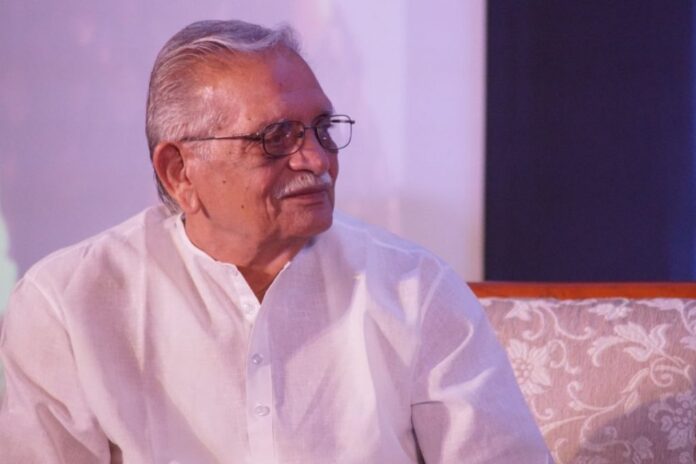
Niraj Krishna
“There’s so much to be found in life. It’s just that we count only what couldn’t be achieved,” says Gulzar. The word “Gulzar” is composed of two parts: “Gul,” meaning “flower,” and “zar,” meaning “garden” or “residence.” “Gulzar” is often used as a poetic or literary name. It is a symbol of an artistic domain where thoughts, emotions, and ideas blossom like flowers. It’s noteworthy that “Gulzar” is also a popular name for Indian poet, lyricist, and filmmaker Sampooran Singh Kalra, who is widely known by this name.
The Jnanpith Selection Committee announced on Saturday that renowned Urdu poet Gulzar has been named as the recipient of the 58th Jnanpith Award. Gulzar is celebrated for his work in Hindi cinema and is considered one of the finest Urdu poets of this era. Prior to this, he had already received the Sahitya Akademi Award for Urdu in 2002. There couldn’t be a better choice than Gulzar for the prestigious Jnanpith. He is a wordsmith par excellence, but if asked, he might also fail to succinctly describe his contributions.
Gulzar weaves images into his poetry with simple and straightforward words that surprise the readers. Sometimes, readers encounter profound thoughts buried on paper unexpectedly, while at other times, they see farmers committing suicide while burying themselves in the soil of debt. These little poems unfold one after another. The long and deep story of life slowly emerges, hinting at a long journey ahead.
Gulzar has embedded every philosophy of life in his poetry, making his poetry stand out for every age group. As a wordsmith, Gulzar embodies the concept that where the sun doesn’t reach, the poet’s arrival can be sensed. Going beyond feelings and looking at any situation with an X-ray vision is Gulzar’s specialty.
It’s an art to express oneself in a few words, and for those who do so, the world labels them as poets, lyricists, or poets. One such person is Gulzar. Gulzar touches the heart with extremely concise words, making it seem as though he has already spoken our minds. His simplicity and his ability to express everything in his own language make it feel like someone is speaking their own thoughts. His simplicity in writing touches the soul. Gulzar is not just an excellent lyricist but also a poet.
Gulzar, who expresses the drops of pain in every word, has a unique story of how he fell in love with ghazals and poetry. When he arrived in Delhi from Jhelum after losing everything in the turmoil of 1947, Gulzar’s education started in a school. During that time, his inclination toward Urdu grew. His closeness to Ghalib grew to such an extent that he fell in love with Ghalib and his poetry.
However, his early journey was quite challenging. In his early days, he worked in a garage. In fact, Gulzar used to do touch-up work on cars. He would paint and repair cars that had scratches or damage from accidents.
Starting his life journey with grease, oil, and garage tools, Gulzar later ventured into playing with words, becoming such a master of poetry that everyone became enamored with him. This led to friendships with renowned authors of the time, including Krishna Chandra, Rajinder Singh Bedi, and Shailendra. Shailendra was a famous lyricist of that era who introduced Gulzar into the world of cinema. It so happened that there was a misunderstanding between Shailendra and S.D. Burman. In such a scenario, Shailendra requested Gulzar to write songs for Vimal Roy’s film “Bandini.”
After that, he got a big break to write songs for the film “Bandini.” With “Bandini,” he began his career as a lyricist and never looked back. The song “Mora Gora Rang Laile” from “Bandini” established Gulzar in Hindi cinema and opened doors for him.
He penned lyrics for many excellent films that were loved by everyone. Gulzar’s poetry still resonates with people today. Poetry is a form of Urdu, known as poetry in Hindi. A poem is written based on a single title. Besides ghazals, all forms of poetry in Urdu literature fall within the realm of poetry. Some other poems, Pukhraj and Raat Pashmine Ki, are collections of Gulzar’s excellent poems.
Gulzar prefers writing in Urdu. His compositions are mainly in Hindi, Urdu, and Punjabi, but he has also written works in Braj Bhasha, Khadi Boli, Marwari, and Haryanvi.
Gulzar has received numerous awards and honors in his career, including five National Film Awards, 22 Filmfare Awards, the National Kishore Kumar Samman from the Madhya Pradesh government from 1999 to 2000, an Academy Award for Best Original Song in 2008 for “Jai Ho” from the film “Slumdog Millionaire,” a Grammy Award in 2010, the Sahitya Akademi Award for Urdu in 2002, the Padma Bhushan in 2004, and the Dadasaheb Phalke Award in 2013.
Gulzar has had many ups and downs in his personal life. He married the divorced actress Rakhee. This relationship did not last long. But Gulzar Sahib always appears in crisp white clothes; it is not that he started wearing white clothes after becoming popular. Gulzar has been wearing white clothes since his college days. Apart from being a poet and lyricist, Gulzar is also an excellent tennis player.
As a director, Gulzar’s first film was “Mere Apne” (1971), which was a remake of the Bengali film “Apur Sansar.” In most of Gulzar’s films, viewers get to see flashbacks. He believes that a film cannot be complete without showing the past. This glimpse is seen in films like “Kitaab,” “Aandhi,” and “Ijaazat.” His popular films include “Achanak,” “Koshish” (1972), “Aandhi” (1975), “Mera,” “Lekin,” “Kitaab” (1977), and “Ijaazat” (1987). In 1971, he wrote the song “Humko Mann Ki Shakti Dena” for the film “Guddi,” which started being heard in prayers in schools.
In 1973, Gulzar’s film “Koshish,” which was a story of a deaf and dumb couple, Gulzar wanted to connect with the entire story, so he learned sign language for several days so that he could understand the story better and then work on it. Since then, Gulzar has also been working for deaf and dumb children.
Gulzar… When this name is mentioned, along with lions and poetry, a list of hundreds of songs from Hindi films swims in one’s mind. Whether it’s the 1960s and 1970s or the present era, Gulzar has always managed to capture the pulse of time. Otherwise, how is it possible that the same Gulzar who wrote “Mora Gora Rang Laile” for Chhatrapati Shivaji’s birthday also wrote “Beedi Jalai Le” in this era?


